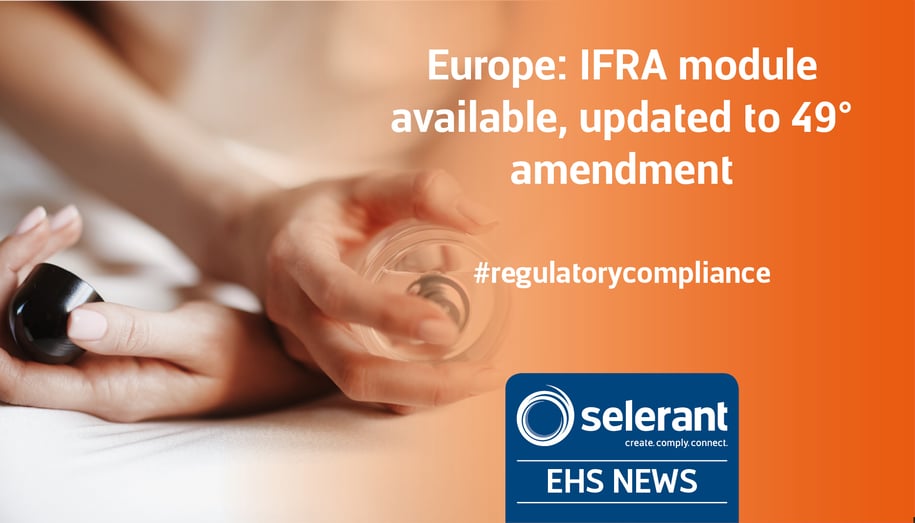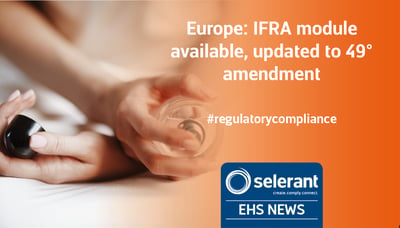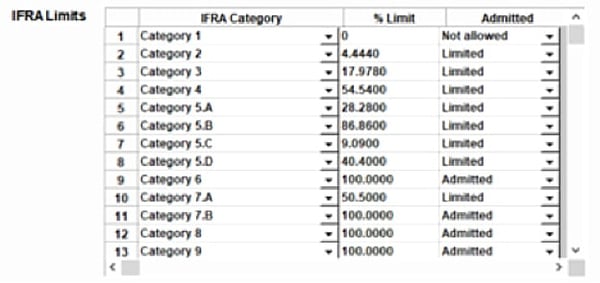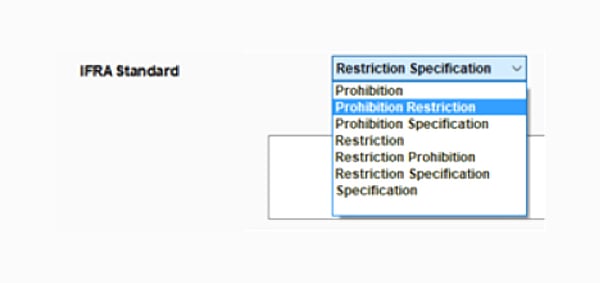
Europe: IFRA module available, updated to 49° amendment
 IFRA, the international fragrance association founded in 1973, is the official representative self-regulatory agency of the fragrance industry and aims to promote the safe use of preparations internationally by using a code of conduct (code of practice) containing IFRA standards.
IFRA, the international fragrance association founded in 1973, is the official representative self-regulatory agency of the fragrance industry and aims to promote the safe use of preparations internationally by using a code of conduct (code of practice) containing IFRA standards.
The main products subject to IFRA standards are:
- products for the fragrance industry
- household cleaning products
- cosmetic products
There are three types of standards in the use of substances within fragrances and these may prohibit, restrict or establish purity requirements for these substances.
As a guarantee of compliance with IFRA standards, companies print an IFRA certificate, which ensures that fragrances are compliant with the standards and that the use of the mixture is safe.
IFRA standards and related documents are subject to periodic changes when significant information on the safety of fragrance substances is collected.
These changes form the basis of the IFRA amendments.
IFRA 49: new standards and documentation
The introduction of the 49° IFRA amendment led to a radical change in the system of risk assessment of substances and, consequently, in the system of categories of IFRA standards and limits.
In fact, the new Quantitative Risk Assessment methodology (QRA2) has been introduced, with which the skin sensitizing approach, phototoxicity and the evaluation of systemic toxicity are combined, generating a new system of categories.
The new list of categories includes a total of 18 entries and the concept of class has been rendered obsolete. The categories now consider systemic toxicity and phototoxicity.
The changes also relate to the limits assigned to substances, so that it is not possible to transport the values of the previous amendments to 49°.
Innovations have also been introduced regarding the certificate: it is based on the categories and no longer on the classes.
The software solution
The IFRA module allows, therefore, the calculation of dose limits for fragrances and perfumed preparations, in accordance with the 49° amendment of the standards issued by the IFRA.


Through the software you can enter the information required by the calculation:
- Dosage limitations and use limitations by category;
- Type of IFRA standard;
- Standard and custom notes;
- Intrinsic properties of substances;
- Custom groups of substances (optional, to be created by technical intervention);
- Flags with which it is possible to specify whether the preparation is an essential oil;
- Custom cutoff for certificate (optional);
The section of the IFRA Limits in the module allows to insert for each individual Category a different dosage limit (column Limit %).
Through the IFRA Standard Type drop-down menu, it is possible to indicate the type of IFRA standard to which a specific substance is subject. This figure is reflected in the standards published by the IFRA.
For some substances, IFRA standards may provide one or more of four distinct types of notes, plus a custom free text note.
It is possible to assign an intrinsic property or a combination of intrinsic properties to a specific substance, or to place it in one custom group.

Finally, it is possible to activate the essential oils management option, thanks to which it will be possible to inhibit the explosion of the oil formula and to use in the calculation the dosage limit manually inserted by the user, as indicated in the code of practice.
The model allows the creation of two documents:
- The IFRA certificate: is the model document that is generated by the form in accordance with the IFRA code of practice.
- The IFRA analysis document: is a useful tool for changing formulas to make the product compatible with multiple regulatory criteria and restrictions on the use of specific substances. The reporting capabilities offered by the product allow the user to quickly evaluate the composition of the product.
The IFRA module also offers the possibility to modify documents and the calculation of dosages in order to adapt them to your needs.
To know in detail all the solutions available for Trace One SDS Authoring Professional, Trace One SDS Authoring Corporate, HSM and Trace One Devex PLM please contact our Customer Service at EU-customer-service@selerant.com.
Newsletter 134